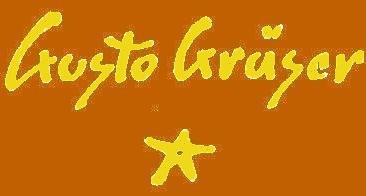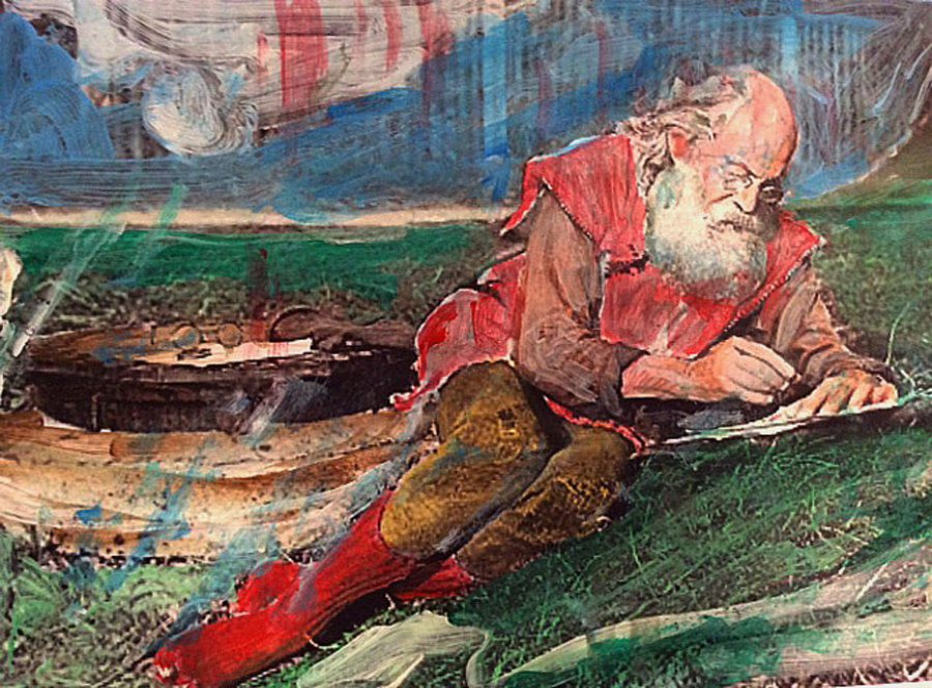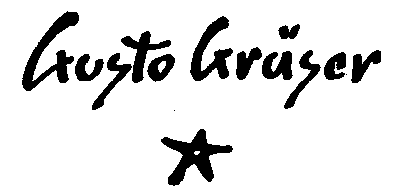 |
 |
 1879 - 1958 |
|
New!
25 August 2024: Icon of Lebensreform from BoTSL* 2015 27 August 2024: Karl Wilhelm Diefenbach (1851-1913) Gusto's earstwhile teacher |
This page
opens the door to Gusto Gräser's world
|
The poet and nature-prophet Gustav Arthur
Gräser was a unique figure in the first half of the
twentieth century. Intellectual leaders of his time
saw him as the personification of the "new human
being", the materialisation of the ideals of Nietzsche
and Walt Whitman, and at the same time a new Francis
of Assisi. His life outside the rules of civilisation
was unconceivable for the people; it generated scandal
and hatred. But for others he became an idol; poets
like Hermann Hesse and Gerhart Hauptmann rose him to a
mythical rank. Most of his own poetry remained unpublished during his lifetime. He distributed epigrams and poems on postcards and handbills, calling mankind for a radical change. Today his image is linked above all to his creation, the "Mountain of Truth" or Monte Verità in Ascona, which has become the symbol of a nature-worshipping counter-culture free of violence. Gräser was born on 16th February 1879 in Kronstadt, Transsylvania, and he died on 27th October 1958 in Freimann near Munich. Together with friends he created the society-reform colony on Ascona's vineyard. In "Public conversations" in major German cities he called for a cultural renewal. He left a life-work of poetry that revives fundamental human symbols. |
|
This is what the Daily Press, Newport, wrote on August 16, 1907 about Monte Verità 1907 “Radiates life” - Qeer Roads Back To Nature On the western hank of Lake Maggiore, in the Swiss Canton of Ticino, where the River Maggia flows into the lake, lies the picturesque village of Ascona, which has of late become known as the abode of a number of well meaning persons who are united in their desire to get back to nature and whose attempts to reach that desirable state are as varied as they are peculiar. Certain it Is that they have selected for practicing their doctrines a spot of natural beauty. The lake side here Is famous for its magnificently wooded high road, between Losone and Ronco, close to which Ascona is situated. Here a wonderful panorama of mountains and lake reveals itself. The sun shines on an average 340 days in the year and winter is almost unknown. Ground is cheap, for owing to the phylloxera scourage, the majority of the native inhabitants have abandoned their unprofitable pursuit of vine growing and have emigrated. Today Ascona is populated chiefly by long haired and bearded strangers, each of whom has a different notion of living the simple life and advocates his system as the only panacea for physical, psychical and social ills. The extreme vegetarians form the most numerous body of this community. In addition to vegetable diet they also consume certain animal products, such as milk, butter and eggs; a heresy strongly condemned by the fruitarians, who subsist exclusively on products of the soil. The former frankly admit that they have adopted their diet mainly for reasons of health; but the latter bring ethical and religious motives to bear on their abstinence from all fresh food. Their prophet is Tolstoi, as far as he is ablee to agree with him. A third group consists of the so called raw fodders. The use of beds and soap these abhor as conventional lies. It was one of these extremists, a former officer in the Austrian army, who persuaded the wife of the ex-Archduke Leopold of Austria to embrace his creed, thus bringing about an estrangement ebetween her and her husband culminating in a legal separation. Another member of this extremist section is a man who says that he “radiates life.” He wears a long toga shaped garment, sandals and no hat, and has never been known to have his hair or beard cut. He goes about with his features wreather in a perpetual smile and invariably carries a flower. [Gusto Gräser!] For a time he lived at the cottage of a humble artisan, but never paid anything for board or lodging. When remonstrated with he smiled disdainfully and admitted it was true that he had eaten the poor man’s bread, but said he had all along radiated life upon him, which ought to be more than sufficient reward. |
||